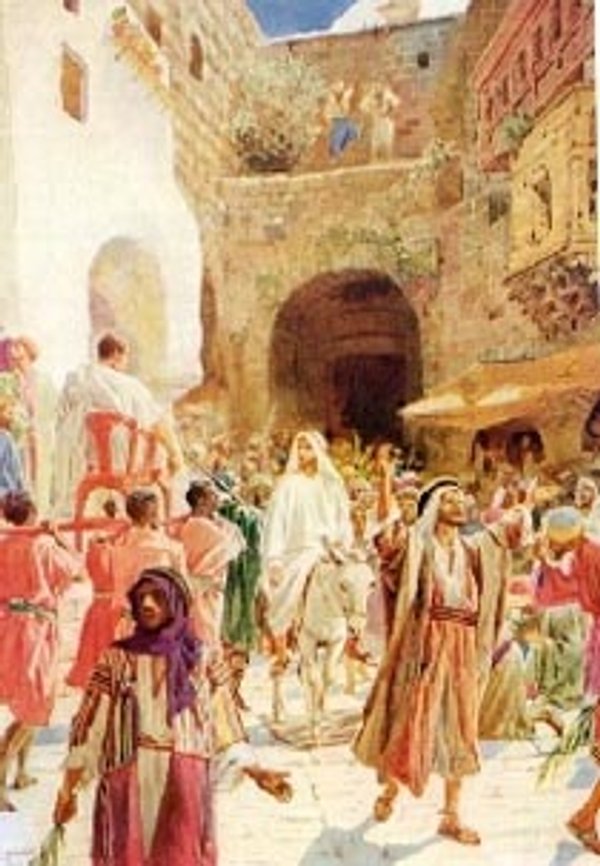Holy Week is beginning and we are recalling Christ’s triumphal entry into Jerusalem. St. Luke describes it: “When he drew near Bethphage and Bethany, at the mount called Olivet, he sent two of his disciples, saying, ‘Go into the village in front of you; as you enter it you will find the colt of an ass tethered there, upon which no one has ever sat. Release it and bring it here. If anyone asks you why you are releasing it, answer him: “Because the Lord needs it.” ’ They went and found the colt, just as he had told them.”
What a poor steed Our Lord chose! In our vanity, we might have chosen a spirited racehorse. But Jesus is guided, not by merely human reasons, but by divine standards. “This happened,” St. Matthew observes, “that the words of the prophet might be fulfilled: ‘Tell the daughter of Sion: Behold, your king comes to you meek and seated on a donkey, on the colt of an animal used to the yoke.’ ”
Jesus Christ, God Himself, is content to have a little donkey as His throne. We, who are nothing, show our vanity and pride by seeking to stand out, to call attention to ourselves. We want others to admire and praise us. St. Josemaría Escrivá, whom John Paul II canonized two years ago, learned from that scene of the Gospel.
He likened himself to a worthless “mangy donkey.” But as humility is truth, he also recognized that he had received many gifts from God, especially the task of opening the divine paths on earth by showing millions of men and women that they can be saints by simply fulfilling their ordinary duties at work.
Jesus enters Jerusalem on a donkey. We ought to draw some conclusions from this scene. Each Christian can and must make of himself a throne for Christ. And so, in these words of St. Josemaría, we find the ring that fits the finger: “If Jesus had been looking for a perfect place when he asked to reign in my soul-in your soul-we would have good reason to despair. But,” he adds, “Jesus was content with a poor animal for his throne…. There are hundreds of more beautiful, useful, and formidable animals. But Christ settled for that one when he presented himself to the people that they might acclaim him as their king. That’s because Jesus has nothing to do with a calculating cleverness or the cruelty of frozen hearts, or striking but conceited beauty. Our Lord esteems the joy of a good heart, a simple step, a clear voice, clean eyes, an ear attentive to his affectionate words. That’s how he wants to reign in souls.”

Let us allow him to take possession of our thoughts, words, and deeds! Let us reject, above all, the self-love that is the greatest obstacle to Christ’s reign! Let us be humble, without assuming merits to ourselves. Can you imagine how ridiculous it would have been had that donkey attributed to himself the acclaim the people were giving to the Master?
Commenting on this Gospel scene, John Paul II recalls that Jesus did not perceive his earthly life to be a quest for power, eagerness for success or career, the will to dominate over others. On the contrary, he renounced the privileges of his equality with God, took on the condition of a slave, made himself like men, and obeyed the Father’s plan even to death on a Cross (Homily, Apr. 8, 2001).
Popular enthusiasm is usually short-lived. A few days later, those who had received him with acclaim would be shouting for his death. And we, do we let ourselves be led by passing enthusiasm? If we notice in these days of Holy Week a close brush with the divine grace of God, that he is passing near, let us make room for him in our souls. Let us spread on the ground more than palm or olive branches; let us put our hearts there. Let us be humble. Let us be mortified. Let us be understanding with others. This is the homage Jesus expects from us.
Holy Week is the occasion to relive the fundamental elements of our Redemption. But let us not forget, as St. Josemaría writes, that “in order to accompany Christ in His glory at the end of Holy Week, we must incorporate into ourselves His complete self-giving; we must feel identified with Him, who died on Calvary.” There is no better way to do that than to walk hand in hand with Mary. May she obtain the grace that these days leave a deep mark on our souls, that they be for each one of us, an occasion to intensify our Love for God so that we can show it to others.
